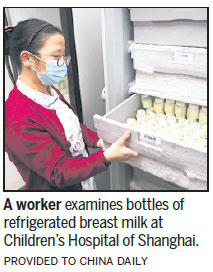Breast milk banks taking deposits
As a nursing mother, Liang Juan must pump and freeze her extra breast milk, as she often has too much for her 7-month-old infant. As the milk can only be stored for up to six months, the second-time mother uses the surplus to make soap or as a fertilizer for flowers.
For mothers like Liang, there is now another way to ensure their unwanted milk does not go to waste, one that helps premature and underweight babies.
A breast milk bank in Xi'an, run by Shaanxi No 4 People's Hospital, is one of 17 such facilities across the Chinese mainland. The donated milk is distributed to infants deemed at high risk, giving them a greater chance of survival.
"Donation is better than wasting this precious resource," said Liang, 33.
She said the process of becoming a milk donor is not straightforward. First, she had to submit her full medical history and undergo a blood test to check for diseases such as HIV and hepatitis.
Once she got the green light, her milk had to be processed so that it could be dispatched across the country to children in need. The process included pasteurization - heating the milk to 62.5 C for half an hour. It is then stored at -25 C until it is used.

One abandoned infant who benefited from the milk bank was an intersex child nicknamed Nannan, who was born at about 23 weeks' gestation with a severe pulmonary infection. Worse, Nannan was allergic to milk powder.
After a month of treatment and consumption of donated breast milk, the baby now weighs 1.9 kilograms, an increase of 400 grams.
"Nannan has ceased vomiting and has improved overall," said Zheng Fengying, a doctor at the hospital's neonatology department and one of the founders of the milk bank.
Since its establishment in May 2015, more than 360 mothers have donated about 260 liters of breast milk, helping more than 700 infants, including 400 premature babies.
The world's first breast milk bank was founded in Vienna in 1909. Fast-forward a century, and there were hundreds in Europe and North America.
The first breast milk bank on the Chinese mainland was in Guangzhou, Guangdong province, in 2013. Other cities followed suit. However, owing to shortages of donors and funds, many are uncertain about their future.
Encouraged to pump
Hong Jiangmiao called a free number, and soon a hospital car was on its way to her home with a nurse and equipment needed to collect her breast milk.
Hong has made more than 20 deposits to Beijing's first nonprofit breast milk bank, which was established in March last year by the private Taihe Maternity Hospital.
Taihe offers a house-call service and rewards frequent donors with free baby swimming classes.
She gave birth to her child at Taihe two months ago and was encouraged by nurses to donate her extra milk.
"We don't accept frozen milk, and we are aware that it is inconvenient to travel to the bank and undergo the complicated screening process," said Wu Wenyi, who runs the hospital's breast milk bank.
Since its establishment, the nonprofit Taihe milk bank has attracted 150 donors and collected about 50 liters of breast milk.
Official data showed that about 7 percent of newborns in China are born premature. "All banks in China face the same problem: The supply lags far behind demand," Wu said.
Unlike organizations abroad, which are largely philanthropic endeavors or charge for the donated milk, most Chinese breast milk banks are run by hospitals.
According to Guo Jiazhong, president of Taihe, the hospital has spent about 300,000 yuan ($43,585) on equipment and pays an annual management fee of more than 300,000 yuan to keep the bank afloat.
"We will not close it, nor will we charge any fees," Guo said. "Breast milk banks must be nonprofit and continue to help these babies."
Xinhua
























